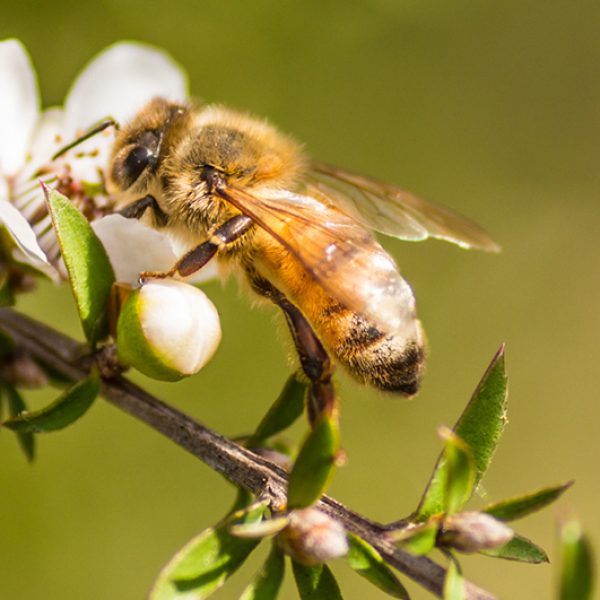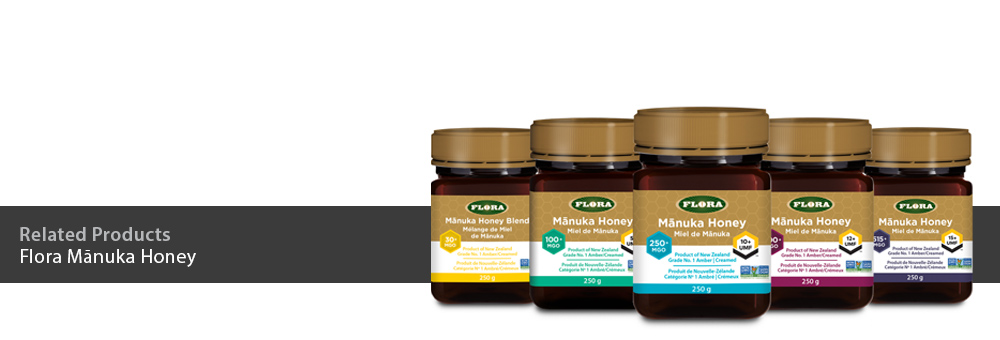

Honey, Let’s Bee Real
Mānuka honey, made exclusively from mānuka flowers, is a unique tasting honey with strong antibacterial properties. Fierce global demand for mānuka has driven up prices and attracted counterfeit and adulterated products. It has become a hot commodity and it’s estimated that 2/3 of global mānuka products are not the real thing.
In a world where antibiotic-resistant strains of bacteria are becoming more the norm, mānuka honey could have a therapeutic role to play, so safeguarding its authenticity has never been more important. New Zealand’s Unique Mānuka Factor Honey Association™ and Ministry for Primary Industries (MPI) are two key bulwarks against counterfeit honey. Real mānuka has a specific “chemical fingerprint” that counterfeit honey cannot match.
Flora Mānuka Honey is licensed by the Unique Mānuka Factor Honey Association™, an internationally recognized, third-party that ensures identity, potency and quality. UMF™ graded products have been tested for three signature compounds: Leptosperin, DHA (Dihydroxyacetone) and Methylglyoxal (MGO). The higher the UMF™ number on the product, the higher the concentration of these compounds. None of these compounds on their own, nor rating systems based on pollen count, are enough to guarantee authenticity. MGO is the main anti-bacterial ingredient unique to mānuka honey Flora Mānuka Honey is also measured and graded according to the honey’s MGO content. Flora offers a variety of strengths ranging from 30 MGO all the way up to 515 MGO. This is a measurement of the amount of MGO in the honey – so 515 means there’s 515 mg of MGO per kg of honey.
New Zealand mānuka honey is also authenticated through lab testing under New Zealand’s Ministry for Primary Industries (MPI). Mānuka honey must pass 5 tests to be considered authentic and 100% pure.
Flora Mānuka Honey, as an additional layer of transparency, offers a traceability system. Using a smart phone, consumers can scan the label to learn more about their jar of honey (batch specific info, region info, lab test results, UMF certification, etc.). This, along with the UMF™ license, helps ensure confidence the consumer is getting authentic mānuka honey and not adulterated or counterfeit honey.
Flora’s line of mānuka honey is sourced from the Onuku Lands Trust, a 100 % Maori-owned company based in Whakatane, New Zealand. The honey is sourced from several New Zealand North Island locations: Mount Tarawera/Lake Rotomahana and Central Plateau, East Cape, and Northland areas. The honey is unpasteurized, filtered, creamed, stirred at low temperatures (50-70 degrees C) for several days, then aged to increase the MGO content to a standardized amount.
Research on mānuka honey is ongoing with hundreds of studies currently available online at PubMed. Methylglyoxal (MGO) is the key antibacterial ingredient in mānuka honey and was first identified in 2005. Researchers found mānuka honey had MGO amounts ranging from 38-761 mg/kg, up to 100 times as much as conventional honey. Cell studies have found that it can inhibit a wide range of pathogens (e.g. Clostridium difficile, Escherichia coli, Helicobacter pylori, Salmonella spp., Staphylococcus spp., Streptococcus spp.), prevent and eradicate biofilms and work in synergy with antibiotics. It also supports healing and moisturizing of skin and mucous membranes. The effects of the honey occur locally, wherever it comes in contact – so it can be helpful for soothing and supporting the health of the mouth, gums, throat, stomach and intestines. Take it straight off the spoon or visit Flora’s recipe section to get inspiration on some delicious ways to incorporate it with other foods and beverages.

